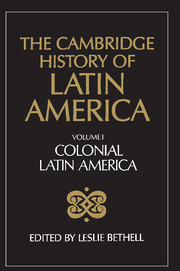Book contents
- Frontmatter
- PART ONE AMERICA ON THE EVE OF THE CONQUEST
- PART TWO EUROPE AND AMERICA
- 6 The Spanish Conquest and settlement of America
- 7 The Indian and the Spanish Conquest
- 8 The Portuguese settlement of Brazil, 1500–80
- 9 Spain and America in the sixteenth and seventeenth centuries
- 10 Spain and America: the Atlantic trade, 1492–1720
- 11 Bourbon Spain and its American empire
- 12 Portugal and Brazil: political and economic structures of empire, 1580–1750
- 13 Portugal and Brazil: imperial re-organization, 1750–1808
- PART THREE THE CHURCH IN AMERICA
- Bibliographical essays
- Indians of the Caribbean and Circum-Caribbean at the end of the fifteenth century
- The discovery and exploration of the New World
- References
11 - Bourbon Spain and its American empire
from PART TWO - EUROPE AND AMERICA
Published online by Cambridge University Press: 28 March 2008
- Frontmatter
- PART ONE AMERICA ON THE EVE OF THE CONQUEST
- PART TWO EUROPE AND AMERICA
- 6 The Spanish Conquest and settlement of America
- 7 The Indian and the Spanish Conquest
- 8 The Portuguese settlement of Brazil, 1500–80
- 9 Spain and America in the sixteenth and seventeenth centuries
- 10 Spain and America: the Atlantic trade, 1492–1720
- 11 Bourbon Spain and its American empire
- 12 Portugal and Brazil: political and economic structures of empire, 1580–1750
- 13 Portugal and Brazil: imperial re-organization, 1750–1808
- PART THREE THE CHURCH IN AMERICA
- Bibliographical essays
- Indians of the Caribbean and Circum-Caribbean at the end of the fifteenth century
- The discovery and exploration of the New World
- References
Summary
THE BOURBON STATE
If the decadence of Spain was to provide students of politics from Montesquieu to Macaulay with manifold occasion for the display of liberal irony, the practical consequences of that decline still haunted the Bourbon statesmen who laboured to rebuild the ramshackle patrimony bequeathed by the last Habsburgs. As to the sheer prostration of the country at the end of the seventeenth century, there can be little doubt. The reign of Charles II, el bechizado (1664–1700), proved an unmitigated disaster, a bleak chronicle of military defeat, royal bankruptcy, intellectual regression and widespread famine. By 1700 the very population had fallen by at least a million below its level under Philip II. About the only qualification to this image of pervasive decay offered by recent research is that the nadir of the crisis occurred during the 1680s. It was during that decade, when a series of bad harvests brought famine to Castile, that the first steps were taken to resolve the financial problems of the monarchy, through the partial repudiation of the heavy burden of debt inherited from previous reigns. At the same time the progressive inflation caused by repeated debasement of the currency was halted by a return to gold and silver as the standard of value. Then again, there is evidence to suggest that Catalonia and Valencia exhibited signs of economic revival well before the advent of the new dynasty. None of which, however, should in any way obscure the fact that Spain had lost her industries and was reduced to exporting agricultural produce in return for foreign manufactures.
- Type
- Chapter
- Information
- The Cambridge History of Latin America , pp. 389 - 440Publisher: Cambridge University PressPrint publication year: 1984
References
- 12
- Cited by



